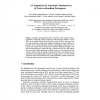Free Online Productivity Tools
i2Speak
i2Symbol
i2OCR
iTex2Img
iWeb2Print
iWeb2Shot
i2Type
iPdf2Split
iPdf2Merge
i2Bopomofo
i2Arabic
i2Style
i2Image
i2PDF
iLatex2Rtf
Sci2ools
127
click to vote
SBIA
2004
Springer
2004
Springer
A Comparison of Automatic Summarizers of Texts in Brazilian Portuguese
Automatic Summarization (AS) in Brazil has only recently become a significant research topic. When compared to other languages initiatives, such a delay can be explained by the lack of specific resources, such as expressive lexicons and corpora that could provide adequate foundations for deep or shallow approaches on AS. Taking advantage of having commonalities with respect to resources and a corpus of texts and summaries written in Brazilian Portuguese, two NLP research groups have decided to start a common task to assess and compare their AS systems. In the experiment five distinct extractive AS systems have been assessed. Some of them incorporate techniques that have been already used to summarize texts in English; others propose novel approaches to AS. Two baseline systems have also been considered. An overall performance comparison has been carried out, and its outcomes are discussed in this paper.
Artificial Intelligence | Extractive As Systems | NLP Research Groups | SBIA 2004 | Significant Research Topic |
Related Content
| Added | 02 Jul 2010 |
| Updated | 02 Jul 2010 |
| Type | Conference |
| Year | 2004 |
| Where | SBIA |
| Authors | Lucia Helena Machado Rino, Thiago Alexandre Salgueiro Pardo, Carlos Nascimento Silla Jr., Celso A. A. Kaestner, Michael Pombo |
Comments (0)

